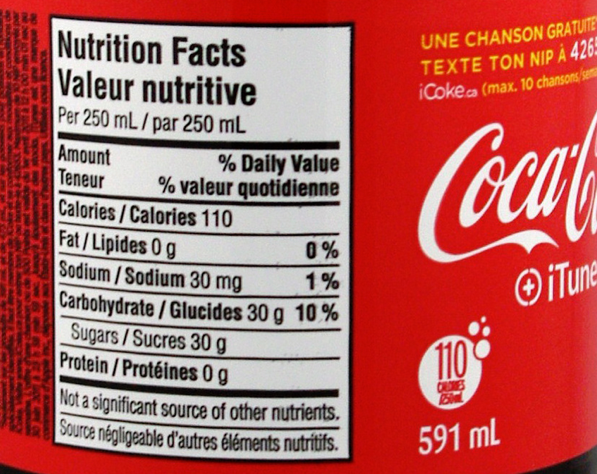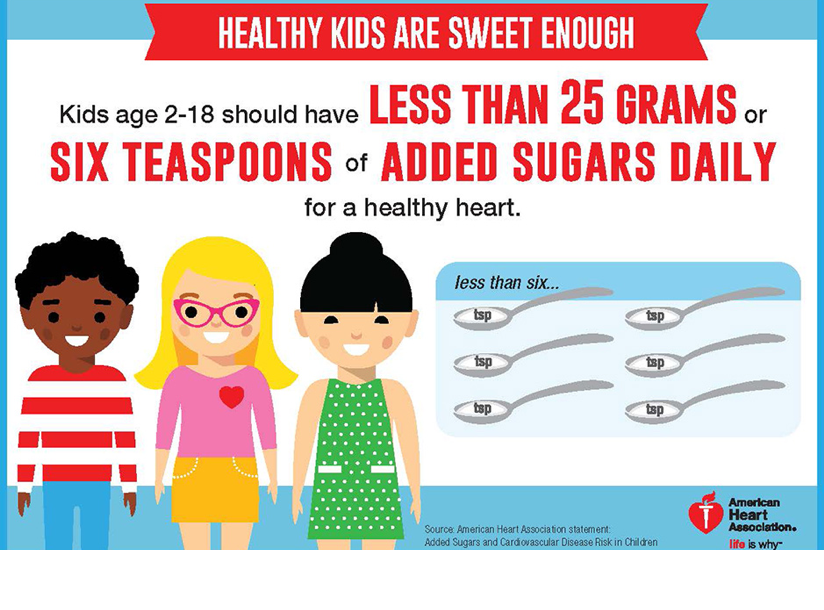Sugar 101 for Adults & Kids
Interested in getting more involved in the Loudoun Chamber’s Health and Wellness Initiative? Click here
Sugar 101 for Adults
Written by Allison Tepper, MS RD LDN
Sugar can get a bad rep, but what to we actually mean when we are talking about sugar? It is important to notice the differences between natural sugar and added sugar, which are quite different when we break it down.
 Let’s start with sugar recommendations. The recommendation of added sugars for adults is no more than 9 tsp per day for men and 6 tsp per day for women. Each tsp has 4 grams of sugar, so if you look at the coca cola label below, we see that it has 30g of sugar, equaling 7.5 tsp of sugar.
Let’s start with sugar recommendations. The recommendation of added sugars for adults is no more than 9 tsp per day for men and 6 tsp per day for women. Each tsp has 4 grams of sugar, so if you look at the coca cola label below, we see that it has 30g of sugar, equaling 7.5 tsp of sugar.
What we don’t want to do is confuse this with recommendations for natural sugars. Natural sugars are those that are found in fruit and dairy, which are foods that provide many benefits. Fruit is high in vitamins, minerals and fiber, making us healthy and lean. Dairy is high in calcium and protein, aiding in bone and muscle health. These foods naturally have a balance of nutrients that will keep blood sugars stable and benefit us long-term.
Too many added sugars can lead to high blood sugar levels and can cause unwanted weight gain, further leading to disease states such as heart disease. Added sugars can be found in soda, baked goods, candy and cereal and can be listed as sugar, brown sugar, brown rice syrup, high fructose corn syrup and honey. Regardless of the name for the sugar, it will react the same way in the body, so one type is not necessarily better than any other.
The goal is not to completely eliminate sugar, but instead be mindful of the amounts that we consume. A good way to identify this is by thinking of the 80/20 rule. Try to make 80% of your food intake nutrient-dense and 20% of your food intake can be allotted for ‘fun foods’. This balance allows you to eat the foods that you enjoy in a way that will keep you feeling healthy and energized.
The main point to remember is that not all sugar is created equally and natural sugars are coming from delicious and healthy food choices. All types can be enjoyed in moderation for a balanced diet.
Sugar 101 for Kids
Written by Stefanie Dove, RDN SNS, Loudoun County Public Schools
The American Heart Association recommends that children between the ages of 2-18 consume no more than 6 tsp of added sugars daily. The same guidelines for adults also apply to children when it comes to being mindful of consuming nutrient-dense options to minimize the unnecessary addedsugars and maximizing the nutritional value of the items consumed.

For example, all milk, including flavored milk, contains 12 grams of naturally occurring sugar from Lactose and an abundance of nutrients essential for the development of children and optimal health and disease prevention in adults. Milk is the number one food source of 3 of the 4 nutrients of concern highlighted in the Dietary Guidelines for Americans: potassium, vitamin D, and calcium.
Flavored milk has the same nutrients found in unflavored milk and studies show that children who consume flavored milk as a regular part of their diet are only receiving 3% of the total amount of addedsugars they consume from this source. In addition to all of the vitamins and minerals found in this item, it is also an excellent protein source for children with 8 grams of protein per 8 fl. oz.
4 Simple Solutions to Reduce Sugar in Your Child’s Diet:
- Reduce the amount of sugar-sweetened beverages consumed. These include sodas, fruit punches, lemonades, and other sweetened beverages.
- Swap some of the fruit drinks for whole fruit. Children and adults should strive to consume 5-9 servings of fruits and vegetables each day. Swapping a cup of fresh berries for a cup of fruit punch not only increases fiber intake, but it also provides vitamins and minerals your child needs.
- Focus on the quality of the foods your child is consuming. It is OK to have everything in moderation, but it is important to be mindful of both the quantity and portion size as well as the ingredients.
- Snacks Matter. One of the easiest things you can do to decrease the excessive sugar intake in children is to have a variety of nutritious snacks on hand both at home and on the go for your family. Keeping fresh fruit, vegetables, trail mix, etc. in locations that are both visible and easy to access, will encourage your child to make mindful decisions when they are seeking a snack.
Interested in getting more involved in the Loudoun Chamber’s Health and Wellness Initiative? Click here
